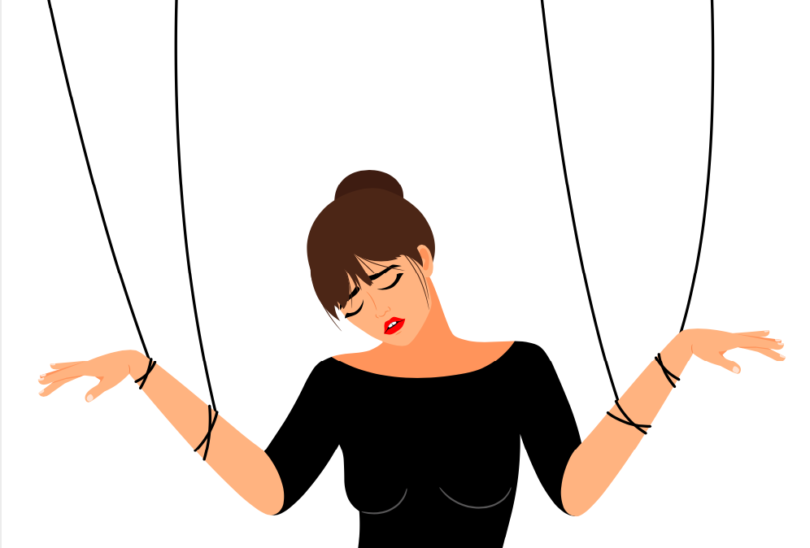Editor’s note: The following essay was submitted by a Bluffton student who wished to remain anonymous. Given the focus of their essay and the sensitive nature of potentially outing someone against their wishes, the request was granted.
The message “bestie…she’s toxic for your mental health,” flashed across my screen as I tried desperately to shut the bedroom door without waking my reoccurring bedmate.
It hadn’t even been two weeks since she decided she wanted to be “just friends.” Yet, she was already laying there on my makeshift bed (two twin sized mattresses pushed together on the floor). And not for the first time since the “break-up,” either. It’s crazy to think how much damage we can do to ourselves in a single moment of weakness, a craving for true affection. The need for validation to be assured.
Like many romances of the 21st century, we met on a dating app. We talked sporadically for a couple of weeks before exchanging Snapchat usernames and then phone numbers. Our locations were close enough that it wasn’t impossible to meet in person, but still far enough apart that we didn’t have to see each other a lot and it wouldn’t be awkward if things didn’t work out. That’s all I really looked for when I swiped right—potential, but no high expectations.
Expectations soon changed when I casually mentioned that I lived alone.
“What? Why didn’t you say that earlier?!” was her immediate reaction, then followed by the making of plans to come stay with me that weekend.
The first weekend of many.
All it took was a simple “I miss you” text for me to start cleaning my room and cancelling all my previously made plans.
The night we broke up I told her that I obviously would be her friend. I wanted to be in her life in any way she wanted me. But the debated question still looms: can exes actually be friends? Can you look at someone you used to sleep with, used to fall asleep on their chest listening to the steady beat of their heart, and no longer want them in that way? And what has to happen for you to be okay with letting all that go?
The topic of expectations in a partner came up in a class discussion recently. Apparently, the expectations in a romantic relationship have drastically changed over the years. The concept of having a life partner was originally a point of financial stability, social status, and a way to create a family. If someone found love and passion in their relationship, that was supposed to be considered a bonus! Now society expects romantic partners to not only take on the role of a lover, but also the role of a best friend and confidant.
I will admit that I have those same expectations. I want someone who I can be romantic with, but still be able to tell them anything. I want to be able to play fight, tease each other, lounge around in ratty sweats all day and still roll over to kiss them goodnight. I want to be able to smile at the smell of their lotion and laugh when I hear the ‘pop’ of them cracking my knuckles. The worst part—that’s what I thought I had.
Originally, I thought she and I were on the same page when it came to expectations. I think she might have thought so too. But once she took away the label of “girlfriends” it seemed like we weren’t even reading the same book anymore. I constantly find myself wondering what I’m supposed to do if she starts dating someone else. I don’t really have a right to be jealous anymore. We’re not dating, we’re just acting like we are except without the official label.
Our encounters went from introducing me, “Hi, this is my girlfriend…” to texts saying, “I just want to be your most bestest friend!” Of course, the texts would then be followed by a sequence of confusing messages, “I still love you SO much,” and “You’re still my baby!” To which I would sit in silence, letting myself overthink every decision that got me to that point. The point where a smirk and grabbing of my face before whispering, “You’re still mine,” became perfectly acceptable. Normal even.
I find myself asking if this “situationship” would still be happening if I were a guy.
I know the label of dating can be a barrier or feel suffocating for some people. Yet I wonder if it’s not so much the label of dating that scares her, but the label of dating a girl? It’s no secret that I was her first experience with a girl. It’s also no secret that neither of our parents approve of us being together. I would easily accept the rejection—understanding firsthand that coming out isn’t easy—and draw a thick friendship line in the sand if she acted different around me now than she did when we were using a label.
My contact name in her phone still hasn’t changed from “Princess” with a crown and kissing face emoji. Her screen background is still a photo of her kissing my cheek while I’m smiling from ear to ear at my birthday party. She still never hangs up the phone, leaves a room, or goes to sleep without emphasizing that she loves me. Part of me actually believes it.
And yet, if someone refers to us as a couple her immediate response is “I’m not gay though! I never was!” Then when the door shuts behind us, her words and actions heavily contradict the previous statement. I look at her with my head cocked and brows knit together before she pouts, “You’re so confused, aren’t you?”
Urban dictionary defines a situationship as “Let’s just chill, have sex, and be confused on the fact that we are not together but have official emotions for each other,” and “A relationship that has no label on it…like a friendship but more than a friendship, but not quite a relationship.” Simply put, yes, I am confused. The only people that don’t seem confused are her and my friends.
My friends are not shy about their disapproval of the situationship, constantly reminding me of the radiating toxicity. I know they are trying to look out for me, to minimize the damage of an inevitable broken heart. I always nod along, knowing deep down that they are right. I do deserve better than a situationship.
But the thought of losing her all together hurts so much more than the hurt of constant confusion and hiding.
My friends’ blatant disapproval makes it hard to talk about her—whether those talks are fueled by confusion and tears or pure lovesick gushing. I can’t blame them for sighing and shaking their heads when I say her name. I would be tired of having the same tediously confusing conversation with me over and over again too.
The conversations got so bad that I felt the need to lie about being around her just to avoid the backlash. Part of me thinks that my lying shows that I’m ashamed. The shame isn’t directed at her so much as at myself for not putting an end to the situation. I’m still mentally preparing myself for the bitter taste of, “I told you so.”
I say all this while wearing her sweatshirt, her comforting scent clinging to each thread. Typing out all of the red flags, staring at the details that make me blissfully ignorant. But what do I really know? I’m just the best friend, of course.







